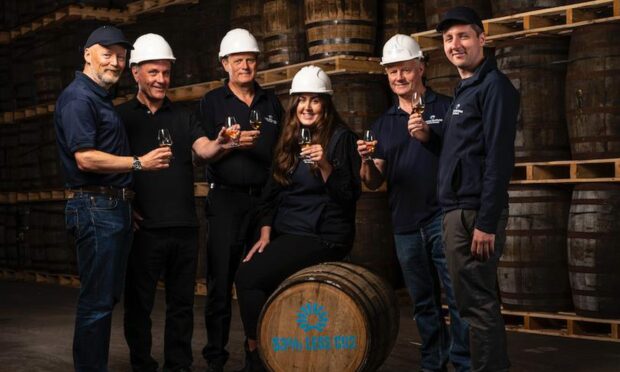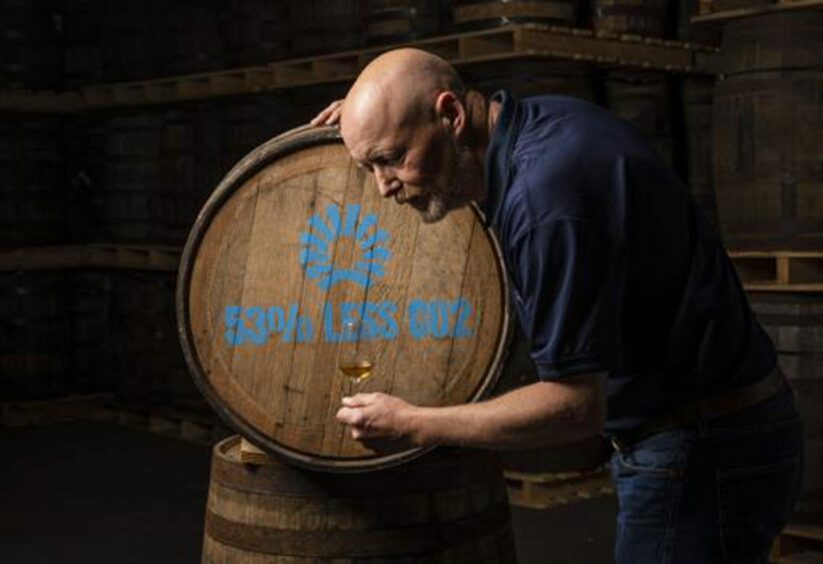Whisky giant Chivas Brothers is sharing the secrets of its carbon-cutting successes with rivals to help the whole industry reach net-zero goals.
Energy Minister Gillian Martin has hailed the move as a potential “game changer” for Scotland’s national drink.
Chivas is the French-owned company behind world-famous brands including Chivas Regal, The Glenlivet and Ballantine’s.
It is making “expertise and learnings” from its use of enhanced heat recovery methods open source from today. Open source is the term used for technology that is shared.
Whisky-maker says it is putting ‘collaboration ahead of competition’
Chivas said technology at its Glentauchers Distillery, near Keith, showed significant benefits of CO2 emissions reduction. Sharing insights of the design process and implementation puts “collaboration ahead of competition on the road to net-zero”, the company added.
“Distillers must work together to create a sustainable future for Scotch, Scotland’s largest export,” Chivas said.
Big energy savings to be made
Vapour recompression technologies in use at Glentauchers were designed to capture and recycle heat generated in the distillation process that would otherwise go to waste.
To date, these have reduced total energy consumption at the distillery by nearly half (48%) and total carbon emissions by 53%. This is an energy saving equivalent to powering 4,979 average UK homes – more than all the houses in Keith – for a whole year, Chivas said.
Plans to roll out these technologies across “viable sites” is part of a drive to achieve carbon neutral distillation by 2026. Chivas expects the measures to reduce its energy consumption and carbon emissions from distillation by 31%, or more than 30,000 tonnes of CO2 per annum.
The company has estimated these technologies, if used by the wider industry’s malt distilleries alone, could deliver an energy saving of about 1,756 gigawatt-hours every year. This would be enough to power an estimated 605,000 typical homes annually, more than there are in Aberdeen and Edinburgh combined.
Chivas chairman and chief executive Jean-Etienne Gourgues said: “Heat recovery forms a critical part of our commitment to achieve carbon neutral distillation by 2026.
“Findings with such significant impact must be shared; this technology has the potential to transform our industry and accelerate its progress to net-zero. That’s why, today, we’re making our design process and implementation learnings available to all.”
New technology ‘won’t be right for every distillery’, Chivas boss says
He added: “As a business with a long history of innovation, we believe this is the right thing to do. Collaboration across our industry will be fundamental if we are to meet collective ambitions around sustainability, safeguarding the long-term future of our product and our planet.
“Understandably, this technology won’t be right for every distillery, but we encourage our peers to explore whether it has the potential to reduce their own carbon output.”
We believe this is the right thing to do. Collaboration across our industry will be fundamental if we are to meet collective ambitions around sustainability.”
Jean-Etienne Gourgues, chairman and chief executive, Chivas Brothers
Ms Martin, SNP MSP for Aberdeenshire East, said: “Chivas Brothers has led the way with an innovative approach which has halved energy consumption at their Glentauchers distillery. Sharing this breakthrough with the wider whisky industry has the potential to advance efforts to reach net-zero across the sector.
“Recycling heat from malt that would be the equivalent of powering all the homes in Edinburgh and Aberdeen could be a game changer for the industry and a boost to Scotland’s economic growth, while helping reach our climate change goals.”
Chivas will host open house events at Glentauchers, creating an opportunity for other distillers to see and find out more about the technology and how it has been integrated.
The company said its recent successes in heat recovery followed a 2021 pilot scheme that achieved energy savings of 88% for a single pot still and highlighted wider potential. The pilot was part-financed by the Scottish Government through the Scottish Industrial Energy Transformation Fund, which aims to support decarbonisation and energy efficiency.
In 2022 Chivas Brothers announced plans to introduce carbon-busting mechanical vapour recompression (MVR) technology at its largest distillery, Strathclyde, in Glasgow. Allt A’Bhainne Distillery, near Dufftown on Speyside, was next to lead the way as the company set about expanding the use of MVR to all viable distilleries by 2026.
MVR is being introduced as part of an £88 million expansion for two of the company’s “strategic” malt distilleries on Speyside, Aberlour and Miltonduff.
Aberlour broke new ground
This builds on the success of another technology, thermo vapour recompression (TVR), which are expected to help Paisley-based Chivas to reduce steam demand at its malt distilleries by at least 40%.
Aberlour was the first Chivas distillery to install thermo compression units during the 1990s, an initiative which was then made open source for the rest of the industry to use.



